Pacific Region
 The Council was formed in 2007 by British Columbia First Nations as an outcome of the First Nations Fisheries Action Plan. The Council has seats for 14 Council Members, which reflect the regional diversity of the province as well as the diversity of First Nations expertise and perspectives.
The Council was formed in 2007 by British Columbia First Nations as an outcome of the First Nations Fisheries Action Plan. The Council has seats for 14 Council Members, which reflect the regional diversity of the province as well as the diversity of First Nations expertise and perspectives.
The roles and responsibilities of the FNFC have grown dramatically over the past few years, and the current focus and direction of the organization is outlined in our 2012-2015 Strategic Plan. The next few years will be a period of transition for First Nations in Pacific fisheries as we advance our interests and respond to changing policy.
The chief focus of the FNFC is to develop governance mechanisms, form collaborative relationships among First Nations organizations, and work together to build a cohesive voice on fisheries matters. Working together will allow First Nations to harness the capacity needed for meaningful engagement and participation in integrated fisheries planning and management, and to inform political processes to generate substantive change on matters related to Pacific fisheries.
Ms. Aimee Arsenault, is the Fish-WIKS partner for the BC First Nations Fisheries Council.
 Vancouver Island University (VIU),聽through its four campuses, 2,000-plus聽employees and thousands of graduates, is a聽major economic engine and an important asset聽operating in various communities of Vancouver聽Island and BC鈥檚 Sunshine Coast. 聽In addition to an annual injection of over聽100 million dollars into the local economy聽through operational spending, VIU is adding聽value to communities in the areas of Aboriginal聽Engagement, Cultural Enrichment, Economic聽Development, Environmental Sustainability,聽Research Excellence and Social Development.聽The graduates of VIU鈥檚 more than 200聽degree, diploma and certificate programs are聽shaping our world in extraordinary ways.
Vancouver Island University (VIU),聽through its four campuses, 2,000-plus聽employees and thousands of graduates, is a聽major economic engine and an important asset聽operating in various communities of Vancouver聽Island and BC鈥檚 Sunshine Coast. 聽In addition to an annual injection of over聽100 million dollars into the local economy聽through operational spending, VIU is adding聽value to communities in the areas of Aboriginal聽Engagement, Cultural Enrichment, Economic聽Development, Environmental Sustainability,聽Research Excellence and Social Development.聽The graduates of VIU鈥檚 more than 200聽degree, diploma and certificate programs are聽shaping our world in extraordinary ways.
The academic partner for Fish-WIKS at Vancouver Island University is聽.
